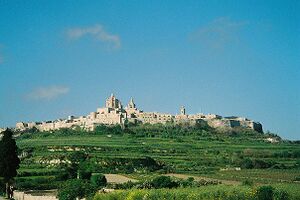
Events[edit | edit source]
Community energy[edit | edit source]
Power generation from photovoltaic (PV) solar cells is increasing in Malta, with total kWp (kilowatt peak) capacity growing by 16.9% from 2017 to 2018. Domestic rooftop installations account for the overwhelming majority of PV installations, and hold 52.1% of total kWp capacity. As of December 2019, EU-funded government grants allowed households to reclaim 50% of the installation costs up to a value of €2,300 from the government. Grants for rooftop solar water heaters, which are popular in Malta, as well as solar feed-in tariffs are also available to help people consider the installation of solar panels.
In October 2017, the Planning Authority approved the 'Solar Farm Policy', aimed at providing appropriate criteria for potential future utility-scale solar farm developments with minimal negative impacts on the landscape, particularly targeting disused quarries, car parks, industrial areas and large rooftops. Since then, multiple utility-scale solar farms been proposed to the planning authority. An 8,000 panel site has been approved at a disused landfill site near Birżebbuġa in February 2019.
A 2018 pilot project led by MCAST was conducted to investigate the potential of floating off-shore solar farms to provide energy for Malta.
Electric vehicles[edit | edit source]
As of March 2022, there were 6,000 electric vehicles registered in Malta.
Cycling[edit | edit source]
The popularity of cycling in Malta as a sport, a means of commuting, and as a way of exploring the island of Malta is on the increase. In recent years, the Maltese authorities, most notably the Malta Transport Authority, have worked hard to make this activity more accessible and safer .
Arts, sport and culture[edit | edit source]
A 2010 Charities Aid Foundation study found that the Maltese were the most generous people in the world, with 83% contributing to charity.
Maltese folktales include various stories about mysterious creatures and supernatural events. These were most comprehensively compiled by the scholar (and pioneer in Maltese archaeology) Manwel Magri in his core criticism "Ħrejjef Missirijietna" ("Fables from our Forefathers"). This collection of material inspired subsequent researchers and academics to gather traditional tales, fables and legends from all over the Archipelago. While giants, witches, and dragons feature in many of the stories, some contain entirely Maltese creatures like the Kaw kaw, Il-Belliegħa and L-Imħalla among others.
About Malta[edit | edit source]
Malta ( MOL-tə, MAWL-tə, Maltese: [ˈmɐːltɐ]), officially the Republic of Malta, is an island country in southern Europe, located in the Mediterranean Sea. It consists of an archipelago between Italy, Tunisia and Libya. It lies 80 km (50 mi) south of Sicily and Italy, 284 km (176 mi) east of Tunisia, and 333 km (207 mi) north of Libya. The two official languages are Maltese, the only Semitic language in Europe and the European Union, and English. The nation's capital is Valletta.
With a population of about 519,000 over an area of 316 km2 (122 sq mi), Malta is the tenth-smallest country by area and the fifth most densely populated sovereign country. Its capital is Valletta, the smallest national capital in the European Union by area and population. According to 2020 data by Eurostat, the Functional Urban Area and metropolitan region covered the whole island and has a population of 480,134. According to the United Nations, ESPON and EU Commission, "the whole territory of Malta constitutes a single urban region". Malta increasingly is referred to as a city-state.